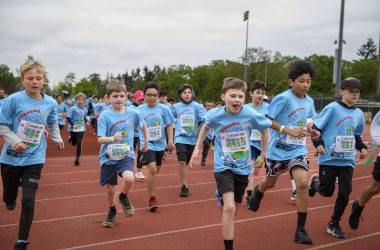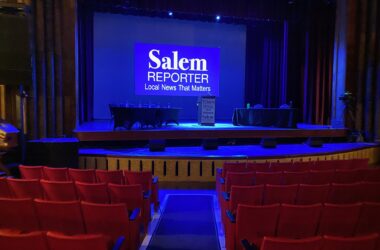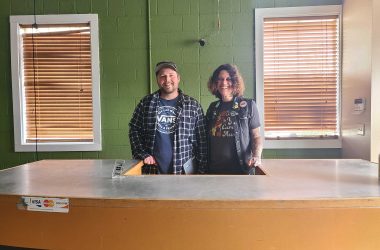Waiting in line at Broadway Coffeehouse, a man sounds out vowels. His friend either nods or corrects him with the proper pronunciation. After getting their orders, they return to their table, where a manila folder full of phrases in two languages sits.
It’s been several years since Dr. Bill Long overheard Iyad Khalaf speaking Arabic with a friend at the coffeehouse. Long, who has studied 20 languages, stopped by to introduce himself. Khalaf was impressed by his knowledge of Chinese poetry, and the two became friends through regular rendezvous to talk about their backgrounds.
“I do a lot of languages. Sort of jokingly to him one day, I said ‘If I appear before the judgment seat of God and don’t know Arabic, I’m going to be tossed out,’” Long said.
Long, a retired visiting Willamette law professor and litigation attorney, studied Arabic a decade earlier, but hadn’t kept up with the language. Khalaf was born in Palestine, grew up in Jordan and hadn’t formally studied Arabic since moving to the U.S. as a teenager.
In November, years into their friendship, they started meeting twice a week at the coffeehouse to go over phrases. It’s not the only language lesson of the day. Khalaf comes to the coffeehouse from Sparrow Furniture just down the street, where he tutors Dari speakers in English. Long would leave the morning’s session with Khalaf to teach Ancient Greek over Zoom.
“We’ve got kind of a language institute, just the two of us,” Long said.
Long grew up on the East Coast,and started learning Spanish through his school at age 12. It was a rarer pursuit in the 1960s, when schools often focused on French. He started learning Latin at 14, and added Greek and Hebrew in college. It was just the start.
“To know the nuance of language, to me, enters into culture and people’s lives in ways few other things can,” he said.
Long’s degrees span divinity, religion and law. He taught at Reed College and wrote editorials for The Oregonian before moving to Salem, where he taught at Willamette from 2003 to 2006.
Khalaf was born about 10 miles north of Jerusalem, and his family moved to Amman, Jordan when he was about five. They immigrated to the U.S. in 1971 when he was 13. He studied chemical engineering and his work in the oil industry took him around the world, including to Australia where he met his wife of 38 years. They raised their kids in Ohio, but his wife doesn’t like cold weather.
“We started looking at places to move to. Oregon just kept coming up at the top of the list,” he said. They chose Salem because it was close to Portland but smaller. “We found the people to be super, super nice,” he said.
Several months into their lessons, the pair disagrees on who’s teaching who.
“The last time I studied Arabic was in eighth grade. In fact, I did not finish eighth grade Arabic,” Khalaf said. “So Bill knowing 20 languages – and so many of them Semitic languages where it’s the same groups, and structure and history – it’s challenging, he’s pushing me.”
Khalaf is happy to practice, but said he’s not a teacher. Long shook his head at that.
“Iyad pronounces it native, and one of the crucial and difficult things about Arabic for English speakers is to get the sounds correct,” he said. “I have good conceptual structures of how languages work, and Iyad is great to correct me and say, ‘No Bill, this is how you pronounce it, this is how we put it together. And actually you’re speaking like you’re a 500 year old man.’”
For Long, a key part of his process is putting together phrases that he wants to know, often to express an emotion or describe something. Khalaf said it’s because he studies like a linguist rather than a tourist.
Bill pulled extensive, mostly legible handwritten notes out of his manila folder, sentences like “He came to us and sat in the chair,” in English and Arabic to form a quasi-lesson plan.
“Here, I’ve got 40 sentences a day,” he said.
“150,” Khalaf said, laughing.

Long started building an example sentence together, moving his hand in the air like a conductor and touching finger to thumb with each syllable. Khalaf corrected him a few times, repeating part of the word with the proper pronunciation.
“I learned that as a learner, you just have to be patient with yourself and not be embarrassed to make mistakes, and to develop a good memory if you can,” Long said.
He said the languages he’s studied at this point, including Chinese, Sanskrit, German and Latin, have helped him understand what’s shaped a large percentage of the world’s people.
“You might not know the particular political parties in Jordan, but if I know the sacred texts and the Quran, I know the people in ways that I might not otherwise,” Long said.
“He mentioned a lot of languages like Sanskrit and Latin and Ancient Greek. Hardly used,” Khalaf said, laughing. “I’m going to start telling you you’re not 500 years old, you’re 5,000 years old.”
Khalaf has been tutoring refugees at Sparrow Furniture since 2018, which combines woodworking apprenticeships with English classes. The store announced last week that it would be closing in order to develop a more comprehensive workforce development program.
“I worked with several different languages, different cultures and it’s very rewarding, very heartwarming when I see somebody improving in their language. To give them hope that, ‘Yeah, we’ll be okay,’” he said.
Long described Khalaf as remarkably generous and patient to meet him every week.
“For me, it’s important to Bill so it’s important to me,” Khalaf said.
Long said the world is connected through stories, and he wants to hear as many of them as possible.
“I am just an avid student of language, belying the socially accepted truism that you decline with age. I think the contrary picture is: you can get enriched with age, and language is one of the hidden ways of doing so,” he said.
Contact reporter Abbey McDonald: [email protected] or 503-575-1251.
SUPPORT OUR WORK – We depend on subscribers for resources to report on Salem with care and depth, fairness and accuracy. Subscribe today to get our daily newsletters and more. Click I want to subscribe!

Abbey McDonald joined the Salem Reporter in 2022. She previously worked as the business reporter at The Astorian, where she covered labor issues, health care and social services. A University of Oregon grad, she has also reported for the Malheur Enterprise, The News-Review and Willamette Week.









